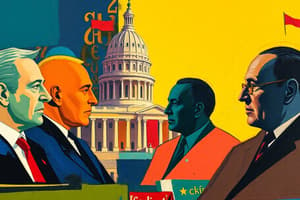Podcast
Questions and Answers
Which of the following is a model of public policy?
Which of the following is a model of public policy?
- Rhetorical Analysis
- Game Theory
- Linear Programming
- Group Theory (correct)
Elite theory suggests that the general public has significant influence on policy outcomes.
Elite theory suggests that the general public has significant influence on policy outcomes.
False (B)
What does group theory emphasize in shaping public policy?
What does group theory emphasize in shaping public policy?
The role of various interest groups through competition and negotiation.
Elite theory posits that a small group of powerful individuals or organizations wield ___ influence over policy decisions.
Elite theory posits that a small group of powerful individuals or organizations wield ___ influence over policy decisions.
Match the following models of public policy with their characteristics:
Match the following models of public policy with their characteristics:
Flashcards are hidden until you start studying
Study Notes
Elite Theory
- A small group of powerful individuals or organizations hold significant influence over policy decisions.
- The general public's influence is minimal, with elites shaping the political agenda and controlling resources.
- Elites form interconnected networks across government, business, and media, reinforcing their influence.
- Policy reflects the interests and preferences of the elite, potentially neglecting broader societal needs.
Group Theory
- Group theory emphasizes that various interest groups shape public policy through competition and negotiation.
- These groups represent diverse interests, including business associations, labor unions, and environmental organizations.
- The model promotes a pluralistic society, where multiple groups can influence policy outcomes.
- Competition between interest groups is seen as a key driver of democratic processes and policy formulation.
- Public policies often emerge as compromises between competing group interests, reflecting their relative power and resources in the political arena.
Institutionalism
- Focuses on how formal governmental structures, such as constitutions, laws, and bureaucracies, shape policy outcomes and constrain actor behavior.
- The theory also considers informal norms, routines, and practices that influence decision-making processes.
- Institutional structures provide a framework for policy implementation and stability, ensuring consistency and predictability.
- These structures can also create barriers to change and limit flexibility in responding to evolving societal needs.
- Institutionalism highlights the importance of understanding the formal and informal rules of the game in shaping policy outcomes.
Example: The RH Law (Responsible Parenthood and Reproductive Health Act of 2012)
- The RH Law aimed to improve access to contraception, maternal healthcare, and sex education.
- The Gabriela Women's Party, an advocate for women's reproductive rights, supported the law, highlighting benefits for family health and women's rights.
- Pro-RH groups, including women's rights organizations and health advocates, supported the law.
- Opposition groups, like the Catholic Church, opposed the law on moral and religious grounds.
- The final law, with some provisions amended to address concerns raised by religious groups, demonstrates a policy outcome shaped by both sides.
Studying That Suits You
Use AI to generate personalized quizzes and flashcards to suit your learning preferences.




